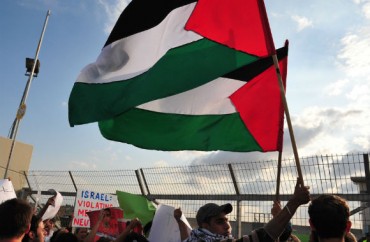
This past weekend, children at a Philadelphia pre-school were entertained by “a perfect Sunday activity”: story time, games, and munchies.
Story time, however, wasn’t your typical Disney-style fairytale or Dr. Seuss rhyme-a-thon. Indeed, the youngsters at the Children’s Community School were treated to the book P Is for Palestine by Rutgers Middle Eastern Studies instructor Golbarg Bashi.
According to Philly.com’s Mari Schaefer, the title was chosen “as much for the colorful photos and rhymes as it was for the controversy it has created.”
Event organizer Rabbi Alissa Wise, who serves as director of the Jewish Voice for Peace, said “We are trying to figure out how to respond to the negative publicity.”
That bad press comes in the form of some in the Jewish community claiming Bashi’s “Palestine ABC book” is antisemitic. The fact that the letter “I” stands for “Intifada” in the story might have something to do with it: “I is for Intifada, Intifada is Arabic for rising up for what is right, if you are a kid or grownup!” it reads.
Two Palestinian uprisings or intifadas against Israel in the 1980s and 2000s killed an estimated 1,000 Israelis and 5,000 Palestinians combined, according to the Forward, a national Jewish newspaper.
The 27,000-member Facebook group “UES Mommas” was temporarily shut down when posts about the book turned into a “hateful debate,” according to the Forward.
The colorfully illustrated book was published using the crowd-sourced fund-raising platform LaunchGood.com; it is reported to have sold out of the initial run of 2,000 copies, according to the site.
Wise hoped that the Philadelphia reading, set to coincide with a similar activity in New York City, would bring more understanding to the meaning of intifada and to the Palestinian culture.
The word can also mean “uprising,” “resistance,” or “rebellion,” which is what many middle-class Americans are taking part in when it comes to opposing the Trump administration, she said.
The book, which also includes pages about foods, markets, holidays, and geographic names, does justice to Palestinian culture, said Brahim Benmbark, 39, of West Philadelphia, who was asked to do the reading.
“It is a wonderful experience,” said Benmbark. “This is the way it should be in my mind.”
Schaefer reports that this controversial event “coincided” with the recent “news” that Centers for Disease Control officials were instructed not to use certain words — such as “diversity,” “transgender” and “science-based” — in budget documents. Mr. Benmbark said that is the “core” of the issue here:
“Words are debatable. We can discuss them,” [he said]. “Nobody should give themselves the right to tell people which words to use.”
Fascist and dictatorial regimes “start by banning words, then paragraphs, then entire books and newspapers” […] Before you know it, you will be living in a dictatorship.”
That’s quite interesting; however, the problem with this comparison is that the director of the CDC said that word-usage edict never happened.
The New Jersey Jewish News reports that author Bashi blames criticism of her book on “self-proclaimed powerful neighborhoods of New York City” — “pretty obvious code language for ‘the Jews,'” article author Stephen Flatow writes.
https://twitter.com/Rachel_Frommer/status/942780284096925697
Fox News reports that P Is for Palestine also states that “Christmas is a Palestinian festival” and “Jesus was an Abrahamic prophet born in a Palestinian city.”
Ms. Bashi told Fox that the tale is “a fun diverse children’s rhyme book” which “tells a social justice story about Palestinian history and culture through each letter of the English alphabet.”
That “social justice” part would explain why the Children’s Community School chose the book; the school’s website has a section devoted to social justice:
“We recognize that there are structural inequalities in our society, which systemically disadvantage people of color, poor people, and people with other marginalized identities. We further recognize that institutions such as schools are complicit in these inequalities, and that it is therefore our responsibility to work to actively resist injustice and to create a school where everyone is welcomed, valued, and safe.”
Read the full Philly.com article.
MORE: Cornell ‘take a knee’ event faculty chant: ‘Free Palestine!’
MORE: Students for Justice in Palestine defends violence against pro-Israel groups
IMAGE: Chameleons Eye/Shutterstock.com
Like The College Fix on Facebook / Follow us on Twitter





Please join the conversation about our stories on Facebook, Twitter, Instagram, Reddit, MeWe, Rumble, Gab, Minds and Gettr.